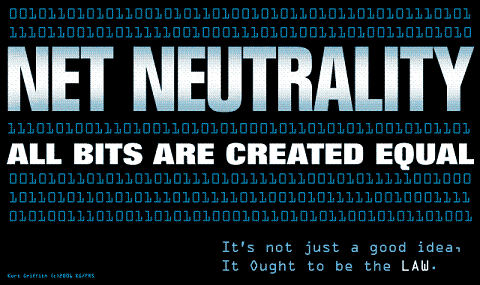by: Jason Mick
Democrat............................................Republican


Jedi Master... err... President Obama is fighting for net neutrality, while the Republicans are opposing him.
The battle over whether internet bandwidth will be neutral or relegated into internet "slow" and "fast" lanes is becoming heated
Internet service providers have long fantasized about charging content providers for the use of "fast" traffic lanes and punishing those who don't pay by relegating them to internet "slow" lanes. Faced with overwhelming public disapproval of such a policy, and pressure from industry giants like Microsoft and Google, the ISPs backed down somewhat. However, as some ISPs continue to plot the eventual deployment of such a plan, an equally heated debate is going on in government over whether legislation and/or rules should be put in place to guarantee that the net remains "neutral" and does not monetize content speeds.
On one side are the Democrats. President Barack Obama is a strong supporter of net neutrality, arguing it's essential for the “little guy” web startups to have a chance against bigger players. The Democrats have lobbyist backing, with Google, and others investing much to try to push through net neutrality legislation. And the culmination of these efforts was FCC Chairman Julius Genachowski's proposal of net neutrality rules yesterday.
The new rules would restrict carriers from discriminating against content or applications (e.g. throttling P2P traffic) and also call for transparency as a means of ensuring these requirements are met. Chairman Genachowski calls the measures "fair rules of the road for companies that control access to the internet."
Some ISPs oppose the measure for various reason. Verizon and AT&T has long kept information on their data network a guarded secret, and the proposal would force them to air information on their traffic, which neither company wants. Other companies like Comcast would be forced to abandon their secret P2P throttling techniques. Others like Virgin want to charge for fast-lanes and are declaring net neutrality "a load of bollocks" as Virgin's CEO puts it.
AT&T encourages the adoption of the rules, but opposes their application to wireless networks. Jim Cicconi, the company's top legal affairs man states, "AT&T has long supported the principle of an open Internet and has conducted its business accordingly. We were also early supporters of the FCC's current four broadband principles and their case-by-case application to wired networks. To the extent that the chairman seeks to bolster the FCC's legal authority to enforce these principles, we would support him. We have also indicated publicly that, despite any compelling evidence of abuses that need correction, AT&T could also consider endorsing a fifth principle relating to actions that are unreasonably discriminatory and that cause material harm. Finally, we have never had concerns with disclosure or transparency regarding network management decisions so long as such requirements are reasonable.
"[But] we are concerned, however, that the FCC appears ready to extend the entire array of net neutrality requirements to what is perhaps the most competitive consumer market in America, wireless services," Cicconi continued.
While the ISPs have kept their criticism relatively quiet, Republican think tanks are more vocally opposing the measures. The telecom industry's majority owners have funded many of these groups and has also funded lobbyists who are pushing the Republicans to block any attempt to put net neutrality in the books.
The Republicans have already launched an attack to try to kill the net neutrality. Texas Republican Senator Kay Bailey Hutchison has added language to a funding bill for the Interior Department that will block the FCC from gaining funds to regulate net neutrality.
The Republicans succeeded in killing similar net neutrality legislation in 2006 -- but at the time, they had a tight grip on the government that they do not have today.
At the end of the day, both the Republicans and Democrats are serving as the voices of greater powers in our nation's economy. On the one side you have companies like Google (and their associated think tanks) that profit from democratization of the internet (which support the Democrats). And on the other side you have the ISPs (and their associated think tanks) that support the creation of an internet oligarchy, with tiered levels of privilege and opportunity (supported by the Republicans) and only a select elite at the fast traffic tier. Only time will tell which of these significant powers will triumph.


